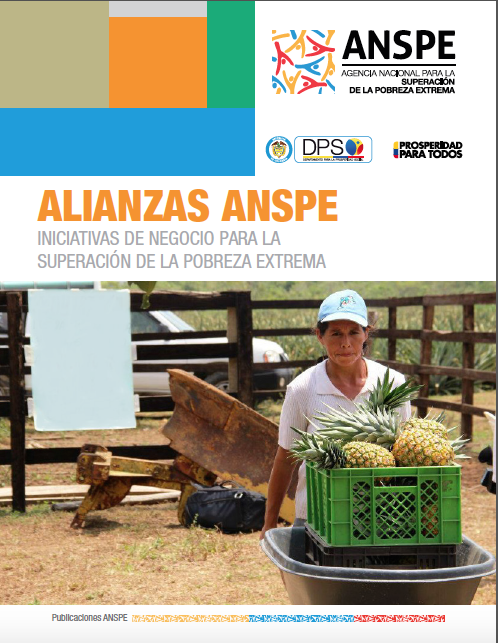Public Policy and promotion of Inclusive Business: Colombia´s approach
Colombia (in South America) has challenging social indicators. According to recent data, 30,6% of the population is poor and the Gini coefficient is 0,539. Not surprisingly, the fight against poverty is a priority issue on the Colombian public agenda. In recent years the approach has been changing and now includes a strong involvement of the private sector through social innovation and inclusive business.
First, a public structure
Colombia has a clear structure to address the fight against poverty. This structure includes the Unidos network and the ANSPE (National Agency for Overcoming Extreme Poverty (“ANSPE” in Spanish).
The UNIDOS network (the second phase of the JUNTOS network) is the National Government’s strategy for overcoming extreme poverty. It is based on institutional support, bringing together 26 State bodies involved in the provision of basic social services to those in extreme poverty. Its emphasis is on ensuring that the poorest families have access to programmes for which they are eligible. The focus is on 10 dimensions related to poverty and human development: Identification, Income and Labour, Education and Training, Health, Nutrition, Habitability, Family dynamics, Banking and Savings, Access to justice and Infant services.
The UNIDOS network is managed by ANSPE, the National Government body responsible for the social promotion strategy for the country’s poorest and most vulnerable populations. In its work, ANSPE has incorporated courses of action in Social Innovation and Private Social Investment, and has moved forward on strategies such as Poverty Free Zones (“ ZOLIP”).
The Call for private sector participation
Within this social policy framework, two initiatives show a greater willingness to face social issues in partnership with the private sector:
1) The Office of Private Social Investment coordinates ANSPE’s dialogue with private entities and non-governmental organizations interested in the development of projects for overcoming poverty, providing them with incentives to focus their investments on initiatives intended for families living in extreme poverty, being responsible for identifying, documenting and promoting best practices in terms of inclusive business and private social investment.
2) Poverty Free Zones are intensive interventions in geographically demarcated zones that seek to make a positive impact on the living conditions of the territory and its inhabitants. This is led by a local public actor in alliance with the private sector, the third sector and the active participation of the community. The intention is to energize the process of family and community support and the management of supply, and meaningful projects are developed around a Territorial Plan for Overcoming Poverty (“PTSPE”).

These two examples show how through social policy, and their mechanisms, Colombia is promoting private sector participation for overcoming extreme poverty. However it is important to note that in Colombia there is no specific regulatory framework, in the form of laws, for the promotion of inclusive business. So although there is the interest and the intention to support inclusive business from the current administration, this could easily change in the future.
(Left: Cover of ANSPE publication with cases of inclusive business for overcoming extreme poverty)
Near future
In addition to addressing the issue of extreme poverty Colombia currently faces a new challenge: a post-conflict society. The role of companies and inclusive business is being developed during the peace process, in a post-conflict setting and as such, new challenges and opportunities are arising in how inclusive businesses can be used as an instrument for the inclusion of vulnerable populations, which will include victims of violence, as well as ex-combatants.
The Colombian context allows us to rethink the scope and the purpose of inclusive business. Today, a question is on the table: how to rethink or reshape the inclusive business for building peace?
Note: The theme of this article was explored in a section of the report Inclusive Business in México and Colombia, published by GIZ, and written by Jenny Melo and Teresa Magdalena. (Available here in spanish - not longer available)
This blog is a part of our May 2015 series on the role of Government and policy in inclusive business. To view all the articles in this series click here.